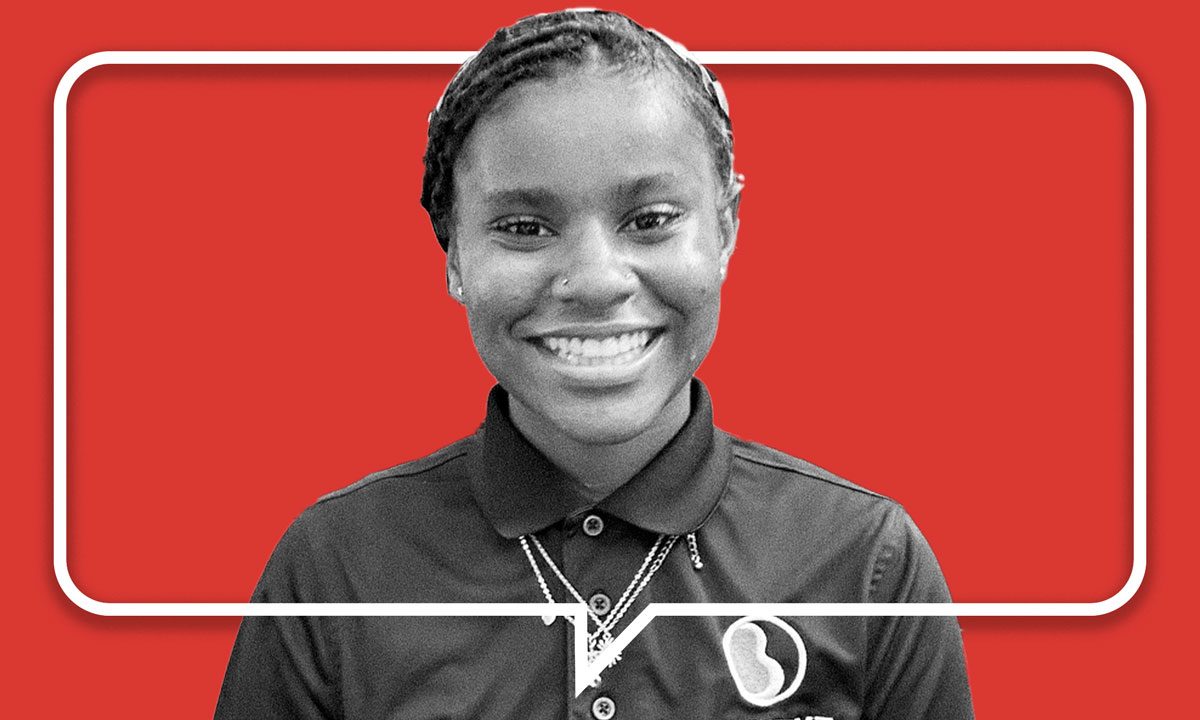As Students Struggle With Math, One Indiana High Schooler Refinds Her Footing
Jania Thomas, a senior at an Indianapolis charter school, stumbled with math during the pandemic, but is now thriving in college-level statistics.

Get stories like this delivered straight to your inbox. Sign up for The 74 Newsletter
Jania Thomas, 17 and a senior at BELIEVE Circle City High School in Indianapolis, was a strong math student all the way through eighth grade.
But then COVID struck.
Thomas had trouble learning the subject online: She mastered some of the material two years behind schedule.
“I always did really well in math — until I entered high school,” she said. “Because of COVID, I had to learn so many things on my own, especially in my ninth-grade year.”
Despite this challenge, Thomas remained a focused and determined student: She’s already earned an associate degree from Ivy Tech Community College and hopes to attend a top-ranked school next fall, possibly Columbia University, to which she applied early decision.
Thomas’s struggle with mathematics mirrors that of students throughout the nation: Test results released in June charting long-term trends show 13-year-olds have suffered tremendous losses. The NAEP scores unveiled in October 2022 revealed a five-point decrease in math for fourth graders and an eight-point plummet for eighth graders, the largest drops ever recorded.
Disparities along racial lines were significantly worsened by the pandemic and the alarming outcomes for Black students on state exams in Indiana, where Thomas lives, prompted the state’s NAACP last year to release an Indiana Black Academic Excellence plan to address long-standing inequities.
Last year, just 5% of Black 10th-graders in Indianapolis, Thomas’s city, passed both the math and English sections of the state’s tests. Recent state assessments show a majority of children in Indiana cannot meet minimum math standards: Just 41% of students in grades 3-8 scored proficient or better in the math portion of the state’s ILEARN exam.
In Indiana and across the country, educators and advocates are searching for ways to make the subject more relevant and engaging — and less a source of failure.
Some are working to address persistent obstacles for low-income children and students of color by re-evaluating their requirements and offerings. To that end, many are providing students with additional pathways — not just one road leading to calculus, a course whose value is being questioned, even for those students who seek a career in STEM.
Thomas is among BELIEVE’s 300 students, most of them children of color: 51% of the charter high school’s student body is Black while 41% are Latino. Nearly all qualified for free or reduced-price lunch last school year.
Thomas is currently enrolled in Advanced Placement Statistics, excelling in a class she believes will one day help her to better her local community.
She’s glad her school offers numerous rigorous mathematics courses and plans to continue with the subject in college where she seeks to study journalism, education and law. Thomas is one of seven children: Hers is the first generation to attend college.
The 74: Do you think it’s possible to skip your freshman year of college after earning so many college credits in high school?
Jania Thomas: I’m hoping that I could move into my sophomore year. It just depends on the college that I get accepted to and how many of my credits transfer over.
Tell me how you’ve done in math through the years.
Before high school, math was, for sure, my favorite subject because it was something that I quickly latched on to and that I could understand. It’s not like the sciences or reading because it’s all stats. You just have to understand the steps. I always did really well in math — until I entered high school.
And what happened then?
Because of COVID, I had to learn so many things on my own, especially in my ninth-grade year. That’s when the letters came into it: sign, cosign, tangents and triangles. I really struggled, especially my freshman year and into my sophomore year.
Did that improve when school resumed?
I was better in the classroom environment. I started to get it because I had more one-on-one time with my teachers. I had to learn things that I thought I knew from my ninth-grade year in my sophomore and junior year.
How have you done since?
When I took my college algebra class at Ivy Tech, I really enjoyed it. It was more focused on degrees, measurements and numbers.
Many students in previous generations were told to take calculus to qualify for top-tier schools. Did you ever hear that?
I’m really glad to have the opportunity to choose the math classes I want: I have more autonomy over the courses I can take. I’ve spoken with my counselor, and she’s never said that.
What role do you think math will play in your professional life?
I don’t know what specific field I want to go into, but I like dealing with finances.
I want to fight against inequality within the American system. I know I’m going to have to understand a lot of concepts pertaining to money, which is all math.
But you want to pursue the subject for other reasons, right?
I want to be someone you could come to if you’re struggling. I want to start a tutoring program. I’ve tutored before and I want to be able to help students in all subjects. If I stopped learning math now, I wouldn’t grow (in that area.) I would rather have a growth mindset than one that’s stagnant.
How far do you plan to go educationally?
I want to get at least one doctorate. I’ve always told myself I will be in school for the rest of my life because I enjoy being in the classroom environment. I’ll just be getting degree after degree after degree, not trying to reach a limit, but just trying to attain the most information that I can so that I can apply it to the real world and teach it to other people.
Are you concerned about paying for school?
That’s one thing that’s given me a lot of anxiety in my senior year. My school is focused a lot on trying to help us fill out scholarships. I’m just going to fill out as many scholarships as I can my senior year and while I’m in college.
Get stories like these delivered straight to your inbox. Sign up for The 74 Newsletter

;)
